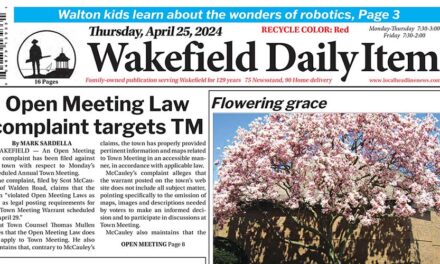Published in the June 13, 2018 edition
By MARK SARDELLA
WAKEFIELD — It looks like the Mexican restaurant Tequila’s will finally be able to open in Greenwood Plaza after the Town Council voted to release the liquor license over the strenuous objections of Police Chief Rick Smith at a meeting Monday night that became heated at times.
The Town Council had approved the liquor license at a prior meeting, pending the fingerprinting of the owners. But when the fingerprinting revealed a past criminal history for both men, including a DUI conviction for one of them, the town withheld releasing the license pending the outcome of Monday’s meeting.
Both of the prospective owners of the eatery, Alvaro Arechiga and Eric Brambila, appeared at this week’s meeting with their attorney Brian McGrail. While McGrail attempted to characterize his clients’ past dealings with law enforcement as youthful indiscretions, Chief Smith maintained that these incidents raised serious questions regarding the character of the men and whether they should be allowed to hold a liquor license in the town of Wakefield.
McGrail reminded the Town Council that Arechiga’s 2014 DUI conviction in Wyoming was disclosed to the town in the application for a liquor license. But Arechiga’s fingerprinting uncovered a Wyoming police report that referenced “multiple DUIs” in South Dakota, where Arechiga lived for a time. It also came up at the time of fingerprinting that he did not have a Massachusetts driver’s license. McGrail told the Town Council on Monday that Arechiga had just received his Mass. driver’s license earlier that day.
McGrail maintained that the reference to “multiple DUIs” in the Wyoming police report was the result of a “coding error.” He said that he made multiple calls to law enforcement officials in South Dakota and could not find any evidence of DUIs for his client in that state. The only one was the Wyoming conviction, he insisted. He included a copy of Arechiga’s South Dakota driving record in a packet supplied to the board. Arechiga also signed a sworn affidavit that the Wyoming DUI was the only such incident on his driving record.
The fingerprinting of Brambila turned up four arrests in Chicago, some while he was a juvenile. Since there were no convictions, McGrail said that he was willing to discuss Brambila’s arrest record, but wondered if it was necessary to discuss those incidents publicly, since the law only requires convictions to be disclosed.
Town Councilor Ann Santos said that she was not comfortable “digging through” those past incidents, suggesting that the towns of Chelmsford and Groton, where Arechiga and Brambila have other restaurants, would not have granted liquor licenses if there were any concerns.
Councilor Tony Longo called Brambila’s past encounters with law enforcement “youthful indiscretions,” adding that the town had gotten “stellar references” from Chelmsford and Groton regarding the liquor licenses held by Arechiga and Brambila in those towns.
But Councilor Edward Dombroski asserted that McGrail had “opened the door” to Brambila’s record, noting that three of the arrests occurred when he was legally an adult.
McGrail maintained that he had been very forthcoming in providing information on those cases to the board. He said that two of the arrests came when Brambila was 16 and all occurred while he was under 21. None were convictions, he said.
When Chairman Peter May called on Chief Smith for his opinion, Smith asked Town Counsel Thomas Mullen if the documents that McGrail had supplied to the board were public record. Mullen said that they were.
Smith began with Arechiga’s drunk driving conviction, noting that the Wyoming record references “multiple OUIs” in South Dakota.
Santos objected at that point, insisting “that has been disproven.”
Chief Smith then said that when Arechiga was being fingerprinted, Lt. Scott Reboulet asked him why he didn’t have a Massachusetts driver’s license. Arechiga allegedly replied that he had only been in the state for “a couple of weeks,” Smith said. But a check of utility records showed that he had been living in Massachusetts for three months.
Smith argued that his lack of truthfulness with Wakefield Police showed a “lack of character and trustworthiness” and made him “unsuitable for this license.”
When Smith began to discuss Brambila’s arrests, McGrail interrupted and asked the Town Council if they wanted to have a discussion of Brambila’s record. Smith pointed out that the information was public record and he wanted to make a recommendation based on that record.
Mullen said that it was up to the Town Council if they wanted to get into it or not.
Dombroski pointed out that the chief is mandated to make a recommendation on the liquor license. He said that he wanted to hear what Smith has to say. “Why the mystery?” he asked.
McGrail said that his clients had nothing to hide and all the information had been sent to the board and is public record.
Santos said that she wanted to move to release the liquor license.
“The chief is not going to change my mind,” she said. Longo seconded the motion.
But Dombroski said, “We are trying to silence our chief. It’s irresponsible of this body not to hear from the Chief of Police.” He added that if there is ever an issue at 1 a.m. at the restaurant, it will be the police who have to deal with it.
Ultimately it was decided to hear from both Chief Smith and McGrail regarding Brambila’s arrests. McGrail led off. He said that the first arrest occurred in 2000 in Chicago, where Brambila was among a group of youths accused of breaking windows and damaging property of a church. He said that the then 16-year-old was released to the custody of his parents.
The second arrest came in 2002, McGrail said, after Brambila’s two pit bulls attacked a puppy. He was charged with “owning dogs for sports fighting.” In an affidavit signed by Brambila, he claims that the puppy wandered from its owner and was attacked by his two dogs in front of his house. He said that he was sleeping at his parents house when he heard the commotion outside at 6:30 a.m. He claimed that he then went outside and broke up the attack. He added that his parents made him give up the pit pulls after the incident.
McGrail said that the foregoing incident also occurred when his client was 16 and it was resolved by releasing him to his parents.
The third arrest resulted from an ordinance charge for “soliciting unlawful business” in 2005 when Brambila was 19, McGrail said. Brambila told the Town Council that he was just hanging out on the street with his friends when the police came by and he was taken to the police station and questioned.
The fourth arrest occurred two years later, in 2007. It involved a charge of reckless conduct in connection to a spray painting/vandalism incident. Brambila claims in an affidavit that he was merely present and did not actively participate in the spray painting.
Chief Smith then offered his perspective on these incidents. Regarding the first one, Smith said that it troubled him that Brambila was arrested rather than just asked to come down to the police station. “That tells me something,” Smith said.
He was even more troubled by the second incident involving the dogs. Smith pointed to a discrepancy between Brambila’s affidavit as to the time of the incident and the police report. He also noted that the puppy had been reported stolen a short time prior to the attack. Smith said that the incident had the earmarks of how pit bulls are trained for sport fighting — a dog is stolen and then the pit pulls are allowed to attack it.
Even more troubling, Smith said, was the “criminal defacement” arrest. Smith said that his reading of the police report and the types of graffiti described suggested to him that these incidents were related to gang activity. He said the messages included the word “hoodlum” and other coded messages consistent with gang communication.
At this point, Santos interrupted again. “This is going far beyond what we do,” she said. “It’s making me embarrassed.”
Smith continued, noting that the police report in the “soliciting unlawful business” says that Brambila was among a group that was on a corner drinking Corona beer and flagging down cars shouting the word “weed.”
Convictions or no convictions, Smith insisted, these incidents of bad behavior reflect on Brambila’s character. He noted that while the cases may have been “continued without a finding,” that does not constitute an acquittal or a dismissal of the charges.
Smith reminded the Town Council that it was his responsibility as Chief of Police to offer his recommendation based on the “character, trustworthiness and integrity” of the applicants. Based on that, Smith said, “I recommend no approval the license.”
Dombroski asked Brambila directly if he agreed with the accounts in the police reports and took ownership and responsibility today for his actions of the past.
Brambila said that in the neighborhood where he grew up in Chicago, police “will pick on you just to get you off the street.” As to the accuracy of the reports, Brambila said, “Half of it is not true.”
Santos said that as a former prosecutor, these incidents did not disturb her. If there was substance to them, she said, “They would not have been continued without a finding.”
DiNocco and Dombroski both indicated that if the liquor license did get released, the owners would be on a very short leash when it came to any violations.
In the end, the Town Council vote 7-0 to release the liquor license.




